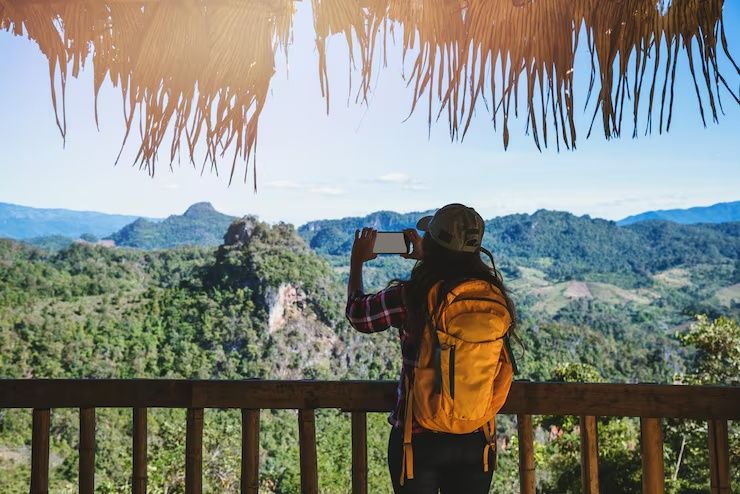Traveling has been a fundamental part of human life for centuries, allowing individuals to explore new cultures, landscapes, and experiences. From ancient trade routes to modern tourism, travel serves as a means of education, cultural exchange, and personal growth.
Importance
Authentic travel guides are important for several reasons:

-
Safety and preparedness: Understanding local conditions, laws, and health considerations helps prevent mishaps.
-
Cultural respect: Guides promote awareness of local traditions, customs, and etiquette, fostering positive interactions.
-
Efficient planning: Information on transportation, itineraries, and accommodations helps travelers make the most of their trips.
-
Sustainable travel: Guides can highlight environmentally conscious practices and responsible tourism.
-
Enriched experiences: Learning about local history, attractions, and culinary traditions enhances the overall travel experience.
Travel guides benefit tourists, educators, researchers, and travel enthusiasts by equipping them with practical knowledge to navigate diverse destinations responsibly and enjoyably.
Recent Updates
The travel landscape has evolved significantly in the past year:
-
Post-pandemic recovery: In 2023–2024, many destinations have reopened with updated health and safety protocols, improving accessibility for travelers.
-
Digital tools: Travel apps and websites now integrate real-time information on weather, transportation schedules, and local events.
-
Sustainable tourism trends: More travelers and destinations are prioritizing eco-friendly accommodations, local experiences, and carbon-conscious travel options.
-
Cultural experiences: There is growing interest in authentic cultural immersion, such as homestays, culinary tours, and local craft workshops.
-
Travel advisories: Governments regularly update travel alerts and safety recommendations, including geopolitical risks, natural hazards, and health considerations.
These trends reflect how travel guides must continually adapt to provide current and actionable information.
Laws or Policies
Travelers are affected by a variety of legal and regulatory considerations:
-
Visa and immigration regulations: Entry requirements vary by country, including visa categories, duration of stay, and documentation requirements.
-
Health and vaccination policies: Some destinations require proof of vaccination or health screenings to prevent disease outbreaks.
-
Customs and import/export rules: Travelers must comply with restrictions on goods, food, and currency to avoid legal issues.
-
Environmental regulations: Certain natural parks or protected areas enforce guidelines to conserve biodiversity and prevent pollution.
-
Transport regulations: Safety and licensing standards apply to public transportation, ride-sharing, and recreational vehicles.
Understanding these rules ensures smooth travel, prevents penalties, and supports responsible tourism practices.
Tools and Resources
Several tools and resources help travelers plan and navigate effectively:
-
Travel apps: Platforms such as Google Maps, TripAdvisor, and Rome2Rio provide navigation, reviews, and itinerary planning.
-
Currency converters: Tools help travelers manage exchange rates and budgeting for different destinations.
-
Language apps: Applications like Duolingo and Google Translate facilitate communication with locals.
-
Health and safety platforms: Websites such as CDC or WHO provide travel health advisories, vaccination information, and emergency guidelines.
-
Cultural guides: Digital or printed guides offer insights into etiquette, local customs, and regional attractions.
Example Table: Key Travel Preparation Checklist
| Preparation Area | Tips and Considerations |
|---|---|
| Documentation | Passport, visa, travel insurance, ID copies |
| Health and Safety | Vaccinations, medications, emergency contacts |
| Accommodation | Research location, amenities, and reviews |
| Transportation | Local transport options, ticket bookings |
| Cultural Awareness | Learn basic phrases, etiquette, and traditions |
| Technology | Offline maps, travel apps, portable chargers |
This table simplifies pre-travel organization for a smooth and informed journey.
FAQs
What is the best way to plan an itinerary?
Start with must-see attractions, consider travel time between locations, and allocate rest periods. Use maps and apps to optimize routes.
How can travelers stay safe in unfamiliar destinations?
Research local safety conditions, avoid risky areas, secure personal belongings, and follow local guidelines and advisories.
Are travel health precautions necessary for all destinations?
Not always, but certain regions require vaccinations or health screenings. Checking official health advisories is recommended.
How can travelers respect local cultures?
Observe dress codes, learn common phrases, follow etiquette, and support local traditions and customs.
What tools help track travel expenses?
Budgeting apps, currency converters, and travel expense trackers can help manage spending and plan efficiently.
Conclusion
Traveling offers an opportunity to explore new landscapes, cultures, and experiences, and authentic travel guides provide the foundation for informed and responsible journeys.
By understanding transportation, cultural norms, health precautions, and local regulations, travelers can ensure safe and enriching experiences. Digital tools, updated trends, and sustainable practices further enhance the travel experience, allowing individuals to navigate the world confidently and consciously.
Whether planning a short vacation or an extended adventure, comprehensive travel information empowers travelers to enjoy destinations fully while respecting the environment and local communities.